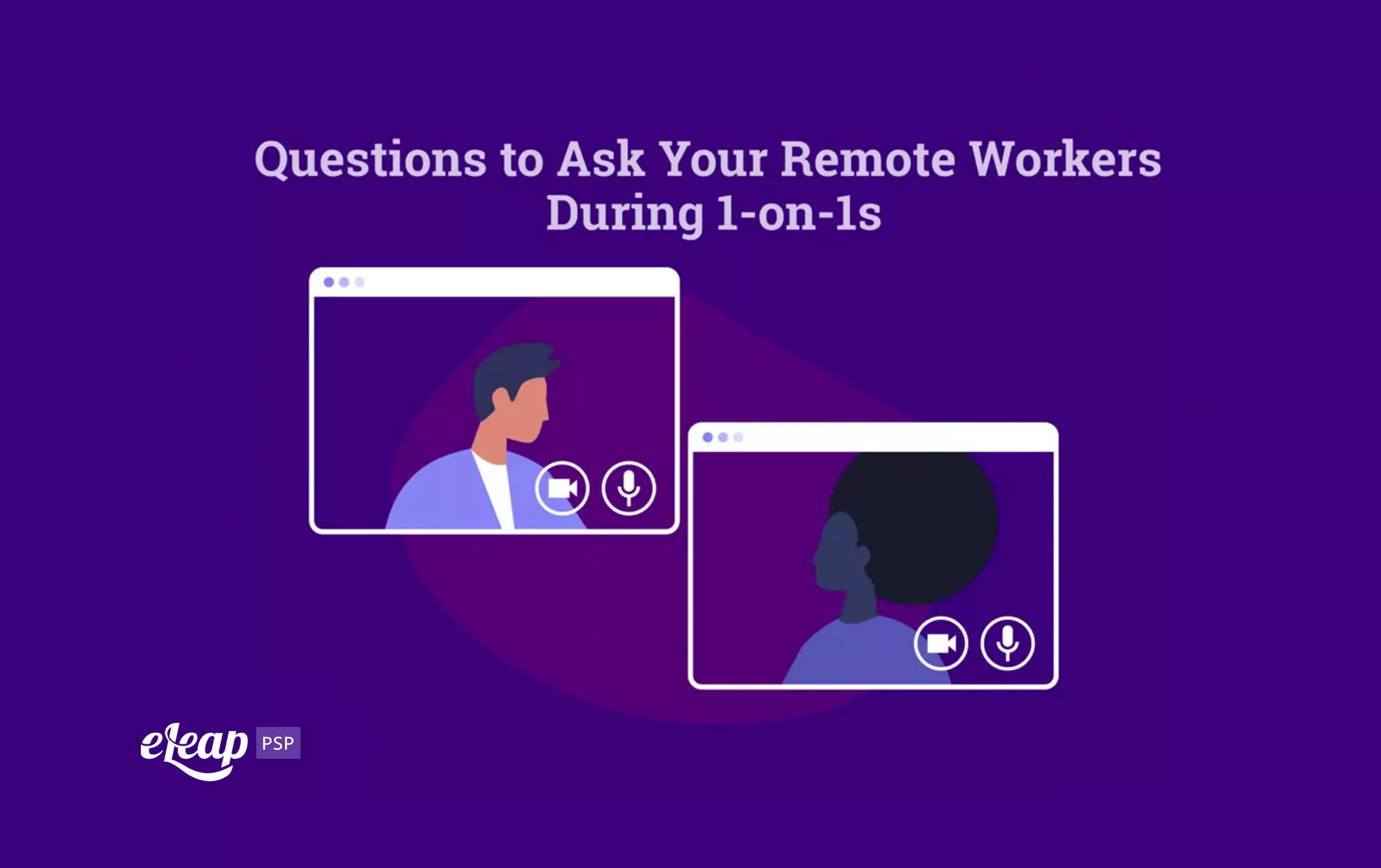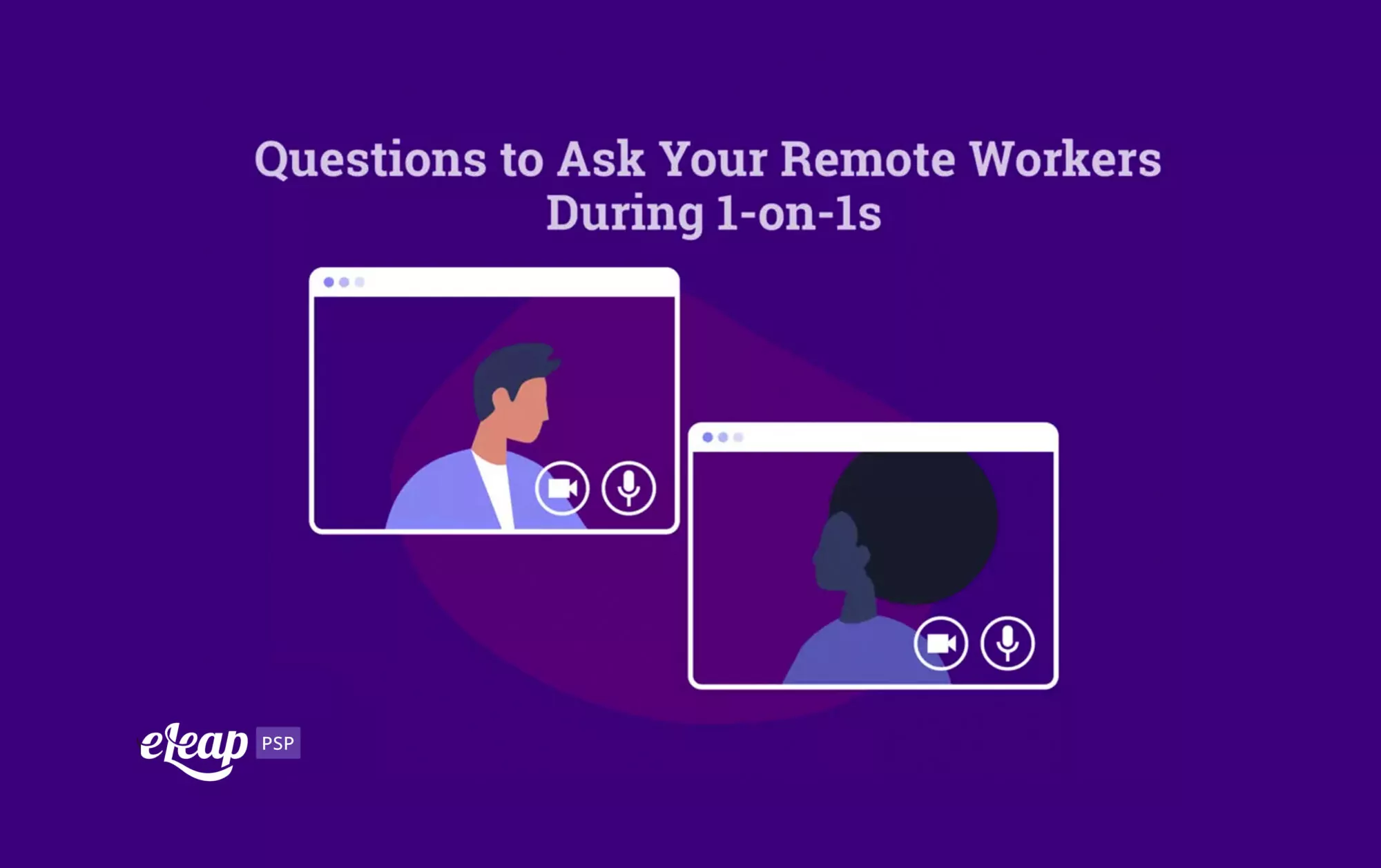Questions to Ask Your Remote Workers During 1-on-1s

Remote workers have become part and parcel of the modern workplace thanks to COVID-19. However, that situation will be slow to resolve – look for some component of your teams to remain remote indefinitely moving forward. That offers quite a few benefits for both organizations and employees, but it also presents some unique challenges when it comes to performance management.
For instance, even if you’ve adopted the modern practice of regular check-ins rather than annual performance reviews, the remote situation makes things challenging. A 1-on-1 between two people conversing over a screen is far less personal and somehow not as meaningful as a sit-down chat with that employee. Thankfully, you can use specific questions to make the situation more personal and to strengthen the connection with team members. Below, we’ll explore some of the most important questions to ask and why they matter to both the organization and the employee.

1. How are you doing?
This is more than just a polite greeting. It’s a critical question that can yield important insight into the mindset of remote workers. In a traditional workplace setting, human beings communicate verbally and nonverbally, and it is easy to tell how someone’s feeling and doing. It’s difficult to pick up on those cues over a video call or a chat message. Come right out and ask.
2. Do you have any questions about your role or your responsibilities?
In a workplace setting, it’s easy to get clarification on things like roles and responsibilities, and yet many employees are still ambiguous about them. In a remote situation, that becomes even more pronounced. Without a clear understanding of what they’re doing and why it matters, remote workers may not be able to work toward a specific goal. In fact, their environment may actually become psychologically damaging.
3. Do you feel like management is handling things correctly?
Always get feedback on your performance as a manager. Inviting critiques of your performance shows that this is an interchange of information rather than a punitive review where you’ll be punishing or rewarding the employee. However, it’s important that you take employee feedback, assess and examine it, and find ways to implement it where possible.
4. What driving force motivated you to achieve your goals?
Learn more about what motivates your remote workers to give their all. What motivates each one? Is it a sense of duty? Is it because they enjoy what they do? Is it a sense of altruism about the difference they’re making in the world somehow? This helps your remote workers feel valued, but it also helps you gain a better understanding of each person and will ensure you’re able to deliver support to each one in the right way for them.
5. How is your life outside the job?
Managers need to realize that employees have personal lives. Those personal lives are at least as important to them as their role in the workplace. By asking about their personal life and actively listening to the answer, you show that you value their whole being and their entire life.
You show that you’re interested in more than what they can bring to the organization. It also helps you understand what might be affecting their work performance. Remember that no one is an island, and things in their personal life will bleed into their professional life, particularly in a remote work situation.
6. What goals have you set for yourself?
Employees should be able to self-assess and set their own goals, at least to some extent. However, those goals must align with department goals and business objectives. Asking what goals they have set for themselves helps ensure that’s the case. It also gives you the chance to reinforce their role and responsibilities, as well as explore how the employee’s efforts tie into achieving larger business objectives.
7. Do you have the tools and resources to reach those goals? What can I do to support you?
Goal-setting is pretty pointless if the employee lacks the tools or resources to achieve those goals. Ask what they need. Is it more training? Is it more time? Is it a redistribution of other responsibilities?
Not only does this help ensure that the employee can reach their goals, but it shows you care about and are invested in their success. It shows that you realize and acknowledge your role as a manager and the organization’s role in reaching those goals.
8. Are there any distractions preventing you from making progress toward those goals?
This is about more than finding out if their kids are being too loud during work hours or if walking the dog is making them take more breaks than usual. Remote work comes with a unique influx of distractions from the business and other employees. Slack messages, chats, and video meetings – all of these break the concentration and distract from progress. Asking this question can help you identify time-wasters and take action.
Maybe you can restructure the number of meetings the employee is required to participate in each week. Perhaps you can change the way some information is communicated. The point is you can streamline their experience based on this feedback.
9. What skill would you like to build?
Learning management is part of performance management. They’re inextricably linked. Find out what skills the employee would like to build.
Why? What would those enable in the workplace or for the employee in a professional capacity? How can you enable them to build those skills? It’s all about empowering your employees and helping them become more well-rounded professionals. That results in better employee retention, business growth, and, ultimately, success.
Build Those Connections
These are just some of the questions that you should ask remote workers during your 1-on-1s. Performance management with remote teams doesn’t have to be difficult. The right questions can bring your team closer, erasing physical distance and helping workers overcome the challenges presented by working from home. It’s all about building connections, communicating accurately, and being dedicated to creating a sense of harmony and oneness even when your employees cannot be in the same physical location.